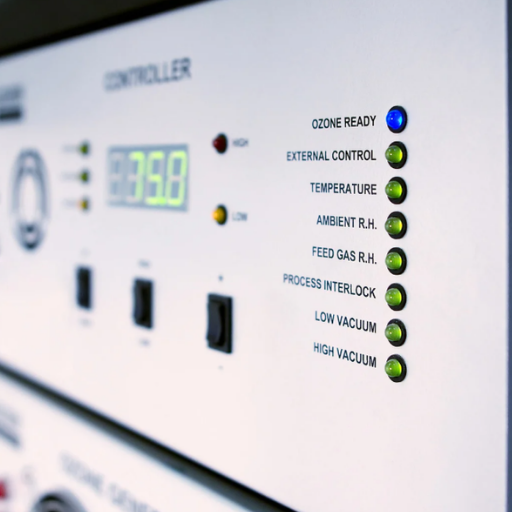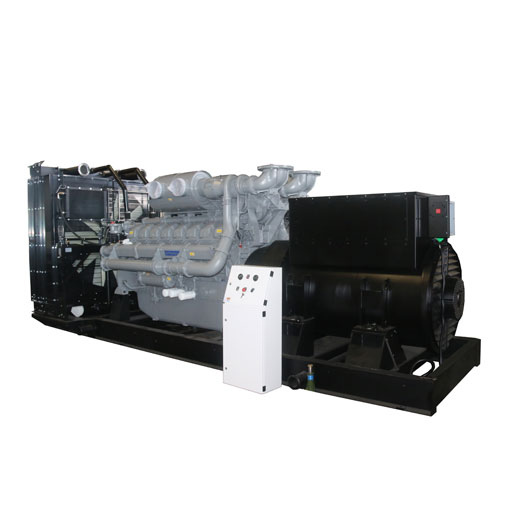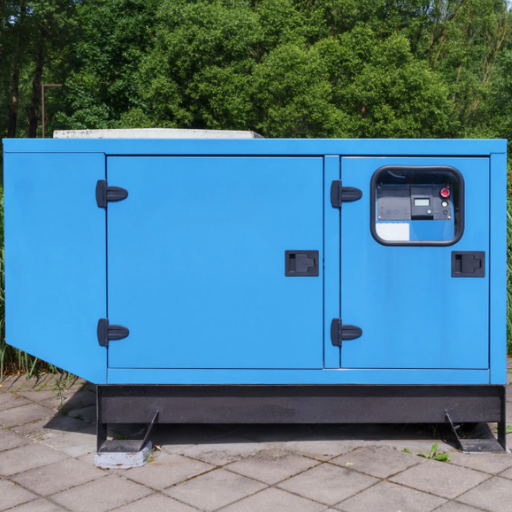Clean and simple, efficient electricity generation by natural gas generators has been widely sought after by homeowners, businessmen, and industries. They, in a way, present another set of benefits that fit in neatly with the application, from backup power during outages to pumping power into critical infrastructure. Like any other energy solution, however, these generators also have their sets of pros and cons, in that you need to weigh in. This article will examine natural gas generators in terms of their major advantages and disadvantages and the different types of power solutions they offer. Searching for your first investment in a generator, or are you just looking to upgrade your present one? Then this title literally comes in handy! So stay tuned to learn everything you ever wanted to know about natural gas generators and how they keep the world working in the modern age.
Overview of Natural Gas Generators

Natural gas generators have always been viewed as reliable and efficient sources of power used during downtime periods or sometimes as the primary generator in an area having readily available natural gas lines. They work by using an internal combustion engine to convert natural gas into electricity. There are advantages such as cheaper fuel cost in contrast to diesel, lower emissions, and fuel supply consistency with a direct pipeline delivery system. These generators are available in various sizes to suit residential, commercial, or industrial power requirements, encouraging their utility for all sorts of applications.
Major Advantages and Disadvantages
- Cost Efficiency
Fuel costs are kept cheaper by natural gas generators as compared to diesel-based generators or gasoline-powered generators. Domestic availability of natural gas keeps the prices quite stable, thus making it a better choice over a more extended period. For example, in various regions, the prices of natural gas in many cases tend to be 30-50% cheaper than diesel, depending on the present energy market situation.
- Environmental Benefits
They emit far fewer pollutants in comparison with diesel generators. The combustion of natural gas results in fewer carbon dioxide, sulfur dioxide, and nitrogen oxide emissions; thus, fewer greenhouse gases. In this situation, the use of natural gas to generate power can reduce CO2 emissions by almost 50% in contrast to coal or fuel oil-based power systems.
- Continuous Fuel Supply
The natural gas line is connected to the generators, which allows for a steady and reliable source of power, unlike generators using stored fuel. This provides an edge during extended power outages or situations where fuel delivery could be delayed.
- Versatility and Scalability
A set of different generation capacities allows for natural generation in various settings, ranging from small residential homes to large-scale industrial facilities. Some units may also be configured for combined heat and power (CHP) use so that waste heat can be efficiently utilized.
Disadvantages
- Dependency on Utility Infrastructure
A chief limitation appears in the reliance on natural gas generators to pipeline access. Power interruptions to gas infrastructure or supply disruptions can render these generators down.
- Higher Initial Costs
Typically, the natural gas generators carry a high initial cost compared to diesel generators. As the situations demand, the installation cost may also go higher due to modification or even extension of the pipeline connections.
- Lower Power Output in Certain Applications
For a large spectrum of uses, these types of power generators do operate for natural gas but limit industries for voltage spikes requiring high bursts of energy, while they have scope for more peak power than diesel power units of the same size.
- Safety Concerns
In spite of recent advances in safety, Natural Gas is flammable, and leaks can prove hazardous unless proper management is in place. Therefore, periodic inspections and adherence to set safety guidelines are paramount in order to minimize potential hazards.
Market Trends and Background
The rise of natural gas generators, with clean energy and efficiency being the focal points of demand, has been a steady trend in recent years. Industry figures indicate that the global natural gas generators market was valued at nearly $5 billion in 2022 and is expected to record a CAGR of 6.5% during the period 2023-2030. This growth can be attributed to enhanced consciousness about greenhouse gas emissions and acceptance of natural gas as a transition energy source.
From the adoption point of view, regions such as North America and Europe lead, on account of having well-built natural gas infrastructure and government policies endorsing sustainability targets. On the other side, the Asia-Pacific developing economies, chiefly China and India, have witnessed increasing demand fuelled by industrial growth and urbanization. In addition, improved generator technologies, such as improved efficiency and compatibility with renewable energy systems, are other forces behind the fast adoption of this market.
Higher chances of power outages, unpredictable weather conditions, and security concerns, ensuring credible backup power, are strong factors, too, that make a natural gas generator a viable option for domestic and commercial setups. Thus, the natural gas generator market is set to witness significant growth over the next decade, riding on the global energy trend and sustainability paradigm.
Environmental Advantages

Natural gas generators are environmentally more friendly when compared with similar fossil fuel options. It emits gases, including carbon dioxide, which are greenhouse gases, so it is a cleaner energy source. Nevertheless, combustion of natural gas releases lower doses of pollutants such as sulfur dioxide and particulate matter; of course, the pollutants are culprits for air pollution. Hence, natural gas generators are a cleaner environment option and at the same time provide power reliably.
Emission and Air Quality Improvements
Because of the reduced environmental impact compared to regular systems, natural gas generators have been gaining more popularity. Recent studies indicate that natural gas combustion emits 50-60 percent less carbon dioxide than a coal-fired plant, depending on the application and technology used. Another important factor is that with the advances in emission control technologies nowadays, nitrogen oxide emissions of modern generators are reduced by up to 90%, thus making their contribution to smog formation and acid rain negligible.”
While particulate matter is a key concern in public health and air quality checks, it is close to negligible pollutants from natural gas generators. Similarly, the sulfur dioxide emissions by using natural gas instead of high-sulfur fossil fuels are almost nil and totally eradicated with the use of low-sulfur fuel. In a nutshell, these parameters put natural gas in the spotlight as a transitional energy, moving towards addressing climate change and achieving better local air quality.
Reduced Carbon Footprint
Natural gas constitutes an essential workhorse amid all fuel sources used to minimize the carbon footprint. Less carbon dioxide emitted and diminished particulate matter make it a cleaner and more sustainable alternative to energy for mitigating climate change and air pollution.
Natural Gas as an Eco-Friendly Choice
Being regarded as a somewhat “green” fossil fuel, natural gas is believed to produce fewer emissions as compared to coal and oil. The U.S. Energy Information Administration (EIA) states that burning natural gas to generate electricity produces nearly 50-60% less CO2 emissions than burning coal. Besides, it limits the release of pollutants such as sulfur dioxide (SO2) and nitrogen oxides (NOx), which cause acid rain and form smog.
With the advent of combined-cycle power plants and carbon capture, natural gas systems now work even more efficiently with respect to waste and emissions. For instance, a modern natural gas plant would have the potential to achieve efficiencies up to 60%, whereas a conventional coal-fired plant would achieve maybe around 33% efficiencies. Such innovations show the potential of natural gas to assist in the energy transition and also keep some level of mitigation measures for the environment. Trend analyses further indicate the leading role that natural gas has found for itself in supplanting coal in power generation across various regions in the world, especially where emission regulations are being made graver. This makes it a vital party in the short-term bridging towards renewables.
Economic Benefits

Being a relatively cheap source of energy, natural gas is one of the most influential engines that drive economic activity. The natural gas supply, by itself, is abundant enough and considered cheaper when compared with other fossil fuels. This ensures lower energy costs for industries as well as consumers. On the other hand, given the life cycles within the natural gas chain, numerous jobs are created, starting from extraction to transportation and developing infrastructure for energy needs. In energy diversification, this energy option tends to stabilize the energy market, hence lessening dependency on one source and building economic resilience.
Cost Efficiency and Operational Savings
Natural gas has been very popular because it is cost-efficient for industries and consumers alike. According to the statistics, the prices of natural gas remained significantly lower than other fossil fuels, for instance, coal and oil in the recent past. Therefore, preference has been given to natural gas for electricity generation and heating. The United States Energy Information Agency (EIA) notes that natural gas plants are less costly to operate and quicker to build compared to coal plants, which translates to operational savings in the long run.
For businesses, natural gas can reduce energy overheads between 20% and 30%, depending on consumption and infrastructure. Moreover, newer extraction techniques like hydraulic fracturing and horizontal drilling brought about higher production efficiencies, gyrating costs even further down. On the residential side, an average yearly savings of $874 was reported for homes heating with natural gas compared to electric heating, as per recent utility cost comparisons.
Naturally, these savings can be augmented by higher operational costs of gas appliances, including furnaces and water heaters. Typically, the energy efficiency of such systems can reach up to 90%, meaning less waste and a better share of what is gained. These efficiencies, coupled with an abundant and reliable supply of natural gas, make it an economically sustainable energy option for many applications. This gives it a strong advantage while simultaneously reducing economic stress and optimizing the energy system.
Return on Investment (ROI)
When considered against the initial investment and subsequent operational savings over time, natural gas systems present a very strong ROI proposition. Data shows typical energy-efficient natural gas systems having ROI periods of 3 to 5 years, depending on the installation process and mechanisms through which it is used. Meanwhile, technological upgrades in natural gas systems, such as high-efficiency natural gas boilers and CHP, compensate well in energy usage, attaining almost 90 to 95% efficiency. This means less expenditure on bills for the end-user as time moves on.
Besides, industries and businesses attest to significant savings when they convert to natural gas systems. For example, industrial users realize operational cost savings of up to 30% relative to less efficient energy sources such as coal or oil. Even residential users benefit since replacing older heating systems with modern natural gas equipment reduces heating costs by up to 20%. These numbers compel a compelling argument for the profitability of natural gas systems while also earmarking their criticality for economic progression on the individual and societal levels.
Advantages of Natural Gas in Industrial Applications
- Cost Efficiency: Natural gas is much cheaper when compared to traditional fuels like coal and oil. It ensures industries can save operational costs by 30%, mainly by converting energy efficiently and reducing waste.
- Energy Reliability: Natural gas is a constant source of energy. In the case of fluctuating weather-dependent renewable sources, industrial operations would go for an interruption with natural gas.
- Lower Maintenance Costs: Natural gas-powered machinery requires comparatively less maintenance. Minimizing downtime further helps extend the life of machines, thereby benefiting industries in terms of long-term operational costs.
- Environmental Benefits: Being the cleanest-burning fossil fuel, natural gas emits fewer pollutants that comprise carbon dioxide, sulfur dioxide, and nitrogen oxides.Hence, it makes a better sustainable option for industry meets attorney regulations and sustainability goals.
- Versatility in Applications: Natural gas can be utilized for industrial processes such as heating, cooling, power generation, or raw materials for chemicals, including fertilizers and plastics. With all these options, it stands to cater to various industrial needs.
- Enhanced Productivity: Efficient and reliable natural gas systems mean greater productivity by minimizing energy loss and downtime, thus enabling industries to achieve maximum output with minimum cost.
These advantages undoubtedly mark natural gas as the more favored industrial power source with great economic and environmental advantages.
Technical Performance

Technically speaking, natural gas systems provide the benefits of a continuous energy supply and precision. Its use across a wide array of industrial processes guarantees stable operation, rapid startups, and less energy loss. Furthermore, the infrastructure employed in distributing natural gas is well-developed and reliable, minimizing any disturbances and ensuring an uninterrupted working life for critical plants. This places natural gas in a very reliable position for any industry that demands high operational efficiency.
Efficiency and Reliability Metrics
Natural gas is energy-efficient, with modern combined cycle plants achieving up to 60% efficiency, while a coal plant would be at best 38%. Its reliability is guaranteed, with technology advancing day by day, such as smart grid developments or digital monitoring systems, all aimed toward improving operational stability and minimizing downtime. Based on the latest industry data, natural gas is said to reduce greenhouse gas emissions by about 50-90% compared to coal for electricity generation, and in a polluting category on the cleaner side. The natural gas infrastructure experiences close to 99.999% safety in its delivery through pipeline systems, providing the required performance and consistency in various industrial applications.
Scalability for Various Applications
The scalability of natural gas is unparalleled, making it applicable to numerous events and processes. It can run small home furnaces and large industrial and commercial plants, so its operation is guaranteed amid the changing energy demands, whether for the generation of electricity, manufacturing processes, or even as a transportation fuel. This capability gives it an edge and makes it one of the energy forms gaining preference across diverse sectors.
Comparison with Diesel Generators
From a number of considerations, natural gas emerges as the cleaner and more sustainable alternative relative to diesel generators. In this perspective, diesel generators are considered to increase emission levels of carbon dioxide (CO₂), nitrogen oxides (NOₓ), and particulate substances, leading to pollution and hazardous health effects. Emission-wise, these systems produce approximately 50 percent less CO₂ and practically no particulates, hence considered cleaner from an ecological point of view.
Cost-efficiency is an extra dimension that strengthens the case for natural gas. Diesel prices have wild fluctuations, dictated by market and geopolitical factors. Conversely, natural gas prices generally remain stable through periods of operational activity. According to more recent industry ratings, fuel expenses on generation with natural gas may decrease by 40-60 percent over those of diesel.
Lastly, reliability. Because of engine wear and degradation of diesel fuel in storage with time, diesel generators require more frequent maintenance. In support of natural gas systems, however, cleaner combustion results in lower maintenance requirements and longer equipment life. This is one added advantage since natural gas can be transmitted through pipelines and hence does not require storage or on-site refilling, as is the case with diesel systems.
In a nutshell, operational advantages, cost savings, and environmental perks make natural gas systems an attractive proposition over diesel generators for contemporary energy needs.
Comparative Analysis

Efficiency
From the standpoint of efficiency, the natural gas systems usually beat diesel generators in terms of fuel consumption. This is because natural gas engines have higher thermal efficiency, meaning they produce more energy from a unit of fuel. Although the diesel systems are extensively used for many applications due to their sturdiness, the fuel used is costlier, and the operational costs go up due to frequent servicing required due to wear and tear from their fuel.
Environmental Impact
Natural gas systems provided a larger opportunity in terms of a reduction in greenhouse gas emissions. Furthermore, if we compare in terms of particulate pollution, nitrogen oxide, and carbon dioxide produced, diesel is enormously pollution-generating, and natural gas is a cleaner option in terms of sustainability programs.
Reliability
Both systems offer reliable power, though natural gas has the advantage of a continuous fuel supply through pipelines, sidestepping interruptions. They are subject to disruptions from fuel deliveries and can do so during adverse weather.
Cost
Natural gas systems are more ideal for stationary and long-term applications, particularly where pipeline infrastructure exists. Diesel gensets find more application in short-term ones, especially where being able to shift wind power and or emergency load is of importance.
Suitability
Natural gas systems are ideal for stationary, long-term energy needs, especially in areas with established pipeline infrastructure. Diesel generators, on the other hand, are better suited for short-term or mobile applications where portability is crucial.
The comparison analysis in the above figure highlights how natural gas systems are more efficient, less expensive, and environmentally friendlier, and can be a better option in most of the stationary energy generation.
Natural Gas Generators vs. Diesel Generators
These factors stand as comparisons between natural gas-based generators and diesel generators, covering efficiency, cost-effectiveness, effects on the environment, and operational considerations.
Efficiency and Reliability
The natural gas generator has gained a lot of efficiency through improvements in engine design and fuel-burning technology. Stationary applications with natural gas generators demand continuous and reliable power outputs. While diesel generators are efficient with heavy loads, they can experience higher wear and maintenance when used for long durations.
Cost Considerations
In regions with pipeline infrastructures installed, natural gas generally stands to be more cost-effective. Price and stability of natural gas are usually lower and better compared with diesel fuel, thus lowering the long-term operational costs. Diesel-powered generators, on the other hand, have the advantage of lower capital costs, yet higher fuel costs that are tied to fluctuations in world oil markets.
Environmental Impact
One significant difference between these two is environmental considerations, with natural gas generators that pollute 50-60% less greenhouse gases than diesel generators will always be the green choice. Also, this cleaner-burning natural gas in the air produces much less particulate matter and sulfur dioxide compared to diesel fuels.
Maintenance and Longevity
Natural gas generators require less maintenance owing to the fact that natural gas burns cleaner, hence fewer buildups of carbon deposits inside the engine. Conversely, diesel engines require more frequent maintenance, largely due to diesel fuel properties, the revenue of residues, and potential land complications concerning fuel storage.
Noise and Accessibility
Natural gas generators tend to be quieter when operational-their great advantages in residential and noise-sensitive locales. Diesel generators, louder as they are, are preferred for off-the-grid or deep remote locations because of their ease of transport and quick setup, with no need for existing gas infrastructure.
Generally speaking, for any stationary long-term-dimensional solution, the combination of gas-powered plants tends to be geared more toward diesel-generator plants for portability and high demand in off-grid cases.
Natural Gas vs. Coal and Renewables
Issues such as emission potential, efficiency, costs, and long-term sustainability come into consideration when comparing natural gas to coal and renewable energy sources.
- Emissions: It generates 50-60 percent less carbon dioxide for every unit of energy when combusted, compared to coal. There are also much lower levels of sulfur dioxide, nitrogen oxides, and other harmful pollutants released during its burn. Still, though cleaner, the natural gas is a fossil fuel and is thus causing greenhouse gas emissions, mainly methane leaks during extraction and transportation. Wind and solar, by contrast, are not emission sources during their operations and are therefore most environmentally benign.
- Energy Efficiency: Coal-fired power plants commonly work at thermal efficiencies of somewhere between 33-40 percent, whereas the modern natural gas plants can go to around 60 percent, or higher, utilizing combined cycle technology. Renewables like wind and solar do not have the thermal conversion step; rather, they directly collect energy from the environment. Their efficiencies are often influenced by geography and weather conditions.
- Cost: Natural gas is usually cheaper than coal, given its abundance and low operational cost advantages, especially in countries with good-quality infrastructure for extraction and distribution. Then again, the renewables, while eventually the future, are now fast closing in on that. There has been a tremendous cost decline for wind energy and solar PV within the last ten years, where in many parts of the world, they are more competitive than coal and natural gas.
- Sustainability: Natural gas is more a dogmatic bridge toward a low-carbon future, and it is still neither renewable nor limitless. Coal continues to decrease in use because it is a primary contributor to climate change and the least sustainable alternative. Meanwhile, renewables such as solar, wind, and hydro provide an unlimited and sustainable option, almost completely in line with the ultimate climate goals.
In an evolving energy space increasingly dominated by renewable energy sources, ever-improving technological advances and policy incentives have put renewables within the realm of strength alternative sources for energy sustainability. However, natural gas stands its ground as a pathway during the transition imparting a reliable, cleaner alternative to coal and supporting grid stability along with intermittent wind and solar sources.
Future Outlook

The future of energy depends on an ongoing transition into ever cleaner and more sustainable sources. With the onset of climate change, renewable energy sources will in effect act to reduce dependence on finite resources. Technological advancements, peculiar efficiency brought upon in the application of resources, and government commissions of clean energy would further aid this shift. Infrastructure would also require investment along the way to support innovations in storage. International collaboration would also be required so that all could benefit from it: accessible and affordable.
New Trends in Natural Gas Technology
The natural gas industry is rapidly evolving, as new technologies come into play in the extraction, processing, and application of this resource. A big trend in this evolution is CCUS, i.e., carbon capture, utilization, and storage technologies. These technologies promise a very large reduction of greenhouse gases by capturing the carbon dioxide produced from the combustion of natural gas and either storing it underground or using it in industrial processes. For example, studies have shown that CCUS technologies can capture up to 90% of the CO2 from emissions of natural gas plants.
Another disruptive technology is the advent of RNG, a renewable form of natural gas obtained from organic waste materials such as agricultural residue, food waste, and wastewater. Besides cutting down on the emission of methane from the decomposition of waste, RNG offers a greener alternative to conventional natural gas. Global reports indicate the market share of RNG is predicted to grow at a CAGR of about 7% over the next 10 years.
Moreover, improvements in LNG technology are leading to enhanced storage and transport efficiency. Developments in cryogenic insulation and modular LNG terminal designs have provided affordable solutions to remote areas, thus increasing the global reach of natural gas. Making this greener brings digitalization into the picture, with AI and data analytics enhancing production processes and supply chain operations to bring costs down and energy efficiency up.
All these highlighted trends are evidence of the natural gas sector in being serious about sustainability and transformation toward a clean-energy future. In order to meet energy demand while negotiating climate change, sustained investment into these technologies will be indispensable.
Forecasted Developments in Eco-Friendly Solutions
The natural gas sector would largely continue to advance in the direction of green innovations. The prominent facet in this trend is that hydrogen will increasingly gain consideration as a cleaner alternative. Blue hydrogen generation and growth from natural gas involve carbon capture and storage (CCS) technology and are expected to witness over 9% CAGR in the next ten years. This has been viewed as a way by which CO2 emission reduction can be targeted while using the existing infrastructure.
The RNG side is another growth opportunity. RNG, produced from organic waste, is becoming more viable and popular as a potential near-zero carbon emission fuel. Reports indicate that in the previous five years, the production capacity of RNG has jumped by nearly 25%, and this is expected to increase further with renewed attention from governments and industries toward renewable energy sources.
Digital technology means another domain for evolution. AI-led monitoring systems manage energy sufficiently and help reduce methane emissions up to 50%, further minimizing the ecological effects of natural gas operations. Industry forecasts estimate that companies could save billions in operational costs with carbon reductions if technologies such as these come into play.
With such innovations, the natural gas industry could continue to stay in the global energy mix, and together with the long-term sustainability goals.
Final Thoughts on Natural Gas Generators
Natural gas generators continue to stand out as a reliable and efficient source of energy, especially in scenarios requiring consistent power output. Recent advancements in generator technology have significantly enhanced their operational efficiency, with some models now achieving efficiency rates upwards of 90%. Additionally, the use of low-emission engines in these generators has made them one of the more environmentally conscious choices among fossil-fuel-based power solutions.
Data indicates that natural gas generators can reduce greenhouse gas emissions by approximately 30-50% when compared to coal-based systems, contributing to cleaner energy production. They are also cost-effective over the long term, with the average operating cost of a natural gas generator being 20-40% lower than other fossil fuel alternatives, thanks to the abundant supply and consistent pricing of natural gas. From residential backup solutions to large-scale industrial applications, these generators have proven their adaptability and scalability.
Overall, with their improved efficiency, reduced emissions, and cost advantages, natural gas generators represent a meaningful step toward balancing energy demands with environmental responsibility. Their role in supporting both individual users and industrial operations remains critical as the global energy landscape transitions toward a more sustainable future.
Reference Sources
-
Environmental Benefits of Natural Gas Generators – Heritage University
This source highlights the environmental benefits, cost-effectiveness, and reliability of natural gas generators. -
Natural Gas Benefits – Alternative Fuels Data Center (AFDC)
A comprehensive resource discussing the environmental and safety benefits of natural gas, contributing to its appeal as a generator fuel. -
A Comparison of Fuel Choice for Backup Generators – National Renewable Energy Laboratory (NREL)
This document compares natural gas to other fuels, emphasizing its reliability and suitability for long-term power needs.
Frequently Asked Questions (FAQs)
What are the advantages of a natural gas generator?
Natural gas generators offer several advantages, including lower operating costs compared to diesel or gasoline generators, reduced noise pollution, and a longer shelf life for fuel. They provide a reliable power supply and can run on your home’s natural gas line, ensuring uninterrupted power when you need it most.
How do natural gas generators operate?
Natural gas generators operate by using natural gas as fuel to produce electricity. They convert the chemical energy in natural gas into mechanical energy, which is then transformed into electrical energy. This process is efficient, allowing for a stable and reliable power supply.
What are the cons of natural gas generators?
While natural gas generators have many benefits, there are some cons to consider. They may not be as powerful as industrial generators that run on diesel or gasoline, and their performance can be affected by regions where gas prices fluctuate. Additionally, natural gas is typically less accessible in remote areas.
How do natural gas generators compare to diesel or gasoline generators?
Compared to diesel or gasoline generators, natural gas generators are often more affordable to operate and maintain. They produce less noise pollution, making them a better option for residential areas. However, diesel or gasoline generators may offer more power in certain industrial applications.
What should I consider when choosing the right generator?
When choosing the right generator, consider factors such as your power needs, the availability of fuel, and the type of environment in which the generator will operate. Evaluate the pros and cons of natural gas vs. diesel or gasoline options to find the best fit for your home or business.
Can natural gas generators provide a reliable power supply during natural disasters?
Yes, natural gas generators can provide a reliable power supply during natural disasters, especially if connected to your home’s natural gas line. This connection ensures that you have access to fuel even when other sources may be disrupted, offering peace of mind during emergencies.
Are there specific types of natural gas generators?
Yes, there are various types of natural gas generators, including standby generators and portable units. Standby generators are designed for home or business use, providing power automatically during an outage, while portable gas generators are suitable for smaller applications and can be moved as needed.
How do I ensure my natural gas generator operates efficiently?
To ensure your natural gas generator operates efficiently, perform regular maintenance checks, keep the fuel supply steady, and clean the generator components as needed. Monitoring the operating costs of natural gas can also help you identify any potential issues early on.
What is the typical supply of natural gas for generators?
The typical supply of natural gas for generators comes from local utility companies that provide a steady flow through pipelines. In some cases, users may opt for propane as an alternative fuel source, but natural gas is generally more reliable and convenient due to its widespread availability.
